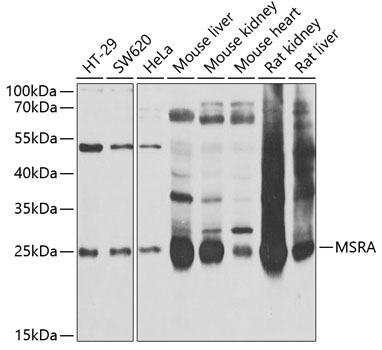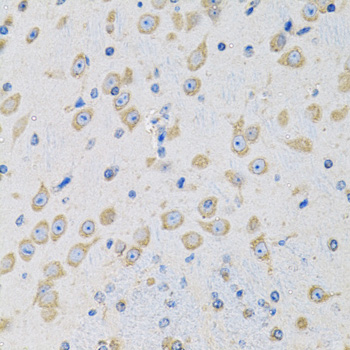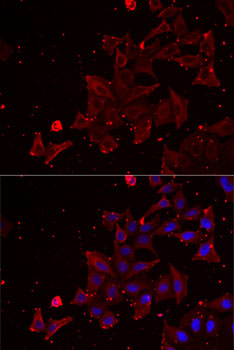Anti-MSRA Antibody (CAB6389)
- SKU:
- CAB6389
- Product type:
- Antibody
- Reactivity:
- Human
- Mouse
- Rat
- Host Species:
- Rabbit
- Isotype:
- IgG
- Antibody Type:
- Polyclonal Antibody
- Research Area:
- Cell Biology
Frequently bought together:
Description
| Antibody Name: | Anti-MSRA Antibody |
| Antibody SKU: | CAB6389 |
| Antibody Size: | 20uL, 50uL, 100uL |
| Application: | WB IHC IF |
| Reactivity: | Human, Mouse, Rat |
| Host Species: | Rabbit |
| Immunogen: | Recombinant fusion protein containing a sequence corresponding to amino acids 24-235 of human MSRA (NP_036463.1). |
| Application: | WB IHC IF |
| Recommended Dilution: | WB 1:500 - 1:2000 IHC 1:50 - 1:200 IF 1:10 - 1:100 |
| Reactivity: | Human, Mouse, Rat |
| Positive Samples: | HT-29, SW620, HeLa, Mouse liver, Mouse kidney, Mouse heart, Rat kidney, Rat liver |
| Immunogen: | Recombinant fusion protein containing a sequence corresponding to amino acids 24-235 of human MSRA (NP_036463.1). |
| Purification Method: | Affinity purification |
| Storage Buffer: | Store at -20°C. Avoid freeze / thaw cycles. Buffer: PBS with 0.02% sodium azide, 50% glycerol, pH7.3. |
| Isotype: | IgG |
| Sequence: | GNSA SNIV SPQE ALPG RKEQ TPVA AKHH VNGN RTVE PFPE GTQM AVFG MGCF WGAE RKFW VLKG VYST QVGF AGGY TSNP TYKE VCSE KTGH AEVV RVVY QPEH MSFE ELLK VFWE NHDP TQGM RQGN DHGT QYRS AIYP TSAK QMEA ALSS KENY QKVL SEHG FGPI TTDI REGQ TFYY AEDY HQQY LSKN PNGY CGLG GTGV SCPV GIKK |
| Gene ID: | 4482 |
| Uniprot: | Q9UJ68 |
| Cellular Location: | Cytoplasm, Lipid-anchor, Membrane, Mitochondrion, Nucleus |
| Calculated MW: | 18kDa/21kDa/23kDa/26kDa |
| Observed MW: | 26kDa |
| Synonyms: | MSRA, PMSR |
| Background: | This gene encodes a ubiquitous and highly conserved protein that carries out the enzymatic reduction of methionine sulfoxide to methionine. Human and animal studies have shown the highest levels of expression in kidney and nervous tissue. The protein functions in the repair of oxidatively damaged proteins to restore biological activity. Alternative splicing results in multiple transcript variants. |
| UniProt Protein Function: | MSRA: Has an important function as a repair enzyme for proteins that have been inactivated by oxidation. Catalyzes the reversible oxidation-reduction of methionine sulfoxide in proteins to methionine. Belongs to the MsrA Met sulfoxide reductase family. 5 isoforms of the human protein are produced by alternative promoter. |
| UniProt Protein Details: | Protein type:Oxidoreductase; EC 1.8.4.11 Chromosomal Location of Human Ortholog: 8p23.1 Cellular Component: actin cytoskeleton; cytoplasm; cytosol; nucleoplasm Molecular Function:peptide-methionine-(S)-S-oxide reductase activity Biological Process: methionine metabolic process; protein modification process; protein repair |
| NCBI Summary: | This gene encodes a ubiquitous and highly conserved protein that carries out the enzymatic reduction of methionine sulfoxide to methionine. Human and animal studies have shown the highest levels of expression in kidney and nervous tissue. The protein functions in the repair of oxidatively damaged proteins to restore biological activity. Alternative splicing results in multiple transcript variants. [provided by RefSeq, May 2014] |
| UniProt Code: | Q9UJ68 |
| NCBI GenInfo Identifier: | 12230350 |
| NCBI Gene ID: | 4482 |
| NCBI Accession: | Q9UJ68.1 |
| UniProt Secondary Accession: | Q9UJ68,Q52TC4, Q549N4, Q66MI7, E9PAS8, |
| UniProt Related Accession: | Q9UJ68 |
| Molecular Weight: | 23,627 Da |
| NCBI Full Name: | Mitochondrial peptide methionine sulfoxide reductase |
| NCBI Synonym Full Names: | methionine sulfoxide reductase A |
| NCBI Official Symbol: | MSRA |
| NCBI Official Synonym Symbols: | PMSR |
| NCBI Protein Information: | mitochondrial peptide methionine sulfoxide reductase |
| UniProt Protein Name: | Mitochondrial peptide methionine sulfoxide reductase |
| UniProt Synonym Protein Names: | Peptide-methionine (S)-S-oxide reductase; Peptide Met(O) reductase; Protein-methionine-S-oxide reductase; PMSR |
| Protein Family: | Mitochondrial peptide methionine sulfoxide reductase |
| UniProt Gene Name: | MSRA |
| UniProt Entry Name: | MSRA_HUMAN |











